GetGo vehicles to be made available within 500m of 50 MRT stations under collab with SBS transit

Car-sharing platform GetGo and bus and rail operator SBS Transit have signed a Memorandum of Understanding today (26 February) to promote car-sharing for better first- and last-mile connectivity to or from SBS Transit’s islandwide rail and bus network.
Under the partnership, GetGo’s car-sharing vehicles will be made available within 500 metres of all the 50 MRT stations on the North East and Downtown lines, as well as SBS Transit-managed bus interchanges.
Apart from this, both companies will also tie-up with external partners and merchants to offer marketing promotions via GetGo’s ‘GetDeals’ loyalty programme to encourage greener commutes. Partners that have previously participated in the GetDeals programme include Sentosa, Singapore Discovery Centre, and The Punggol Settlement.
The partnership between GetGo and SBS Transit aims to create a flexible, inclusive, and sustainable mobility ecosystem in Singapore, and promote the advantages of commuting anywhere by bus, train, and shared cars without the need for personal vehicle ownership.
According to Toh Ting Feng, the CEO and co-founder of GetGo, the company’s partnership with SBS Transit “marks a pivotal step towards realising Singapore’s ‘car-lite’ vision”. “This collaboration underscores our commitment to redefining the future of urban mobility”.
“In line with the Singapore Green Plan 2030, we are fully committed to forging collaborative partnerships
and co-creating innovative solutions that encourage and inspire active mobility for a more sustainable future,” adds Jeffrey Sim Vee Ming, Group CEO of SBS Transit.
Featured Image Credit: GetGo/ SBS Transit
Also Read: GetGo unveils 14,000 sqft office at one-north – aims to double headcount, expand overseas
This duo turned handmade “pursebooks” into a cross-border S’porean social enterprise

When Filipina Mitzi Uy found her househelp crying one day, she never would have imagined that leading to a cross-border social enterprise, Mori.
Her househelp, a mother living away from family, was crying because her daughter was sick and she felt helpless at being unable to care for her.
This troubled Mitzi too as she believed all mothers should have the opportunity to look after their children while being financially independent.
It kept preying on her mind until she had a lightbulb moment—why not use her creativity to help other women by starting a social enterprise?
At that point, Mitzi had already created her own pursebook (a purse combined with refillable notebooks) and had received interest from friends.

So she worked with her househelp to sew about 50 pursebooks and put them up for sale on Facebook. Much to her delight, the response was double their expectations.
From there, she reached out to Sikap Buhay (a Small Business Development and Promotion office in the Philippines) to connect with a Baranggay livelihood project. This allowed her to engage with women from poor communities in Manila who sewed washrags and potholders for a living.
Training mothers to be self-sustaining individuals
In a way, you could call it fate or a good coincidence. Mitzi’s home was close to the Baranggay community and the women themselves had some knowledge of sewing. She would frequently visit them and help upskill their sewing.
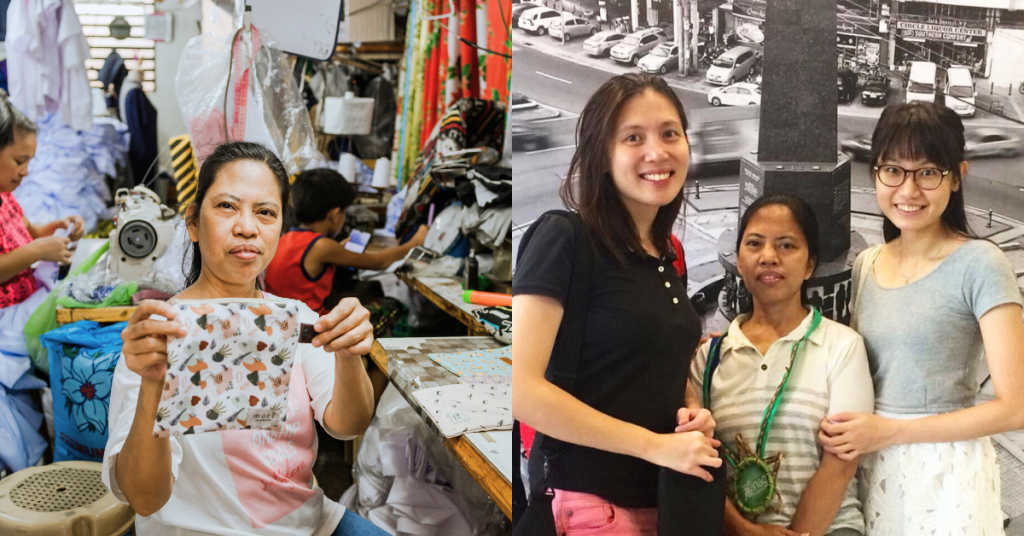
“We wanted to work with mothers to help out their families, because oftentimes single-income households [of] minimum wage isn’t enough to sustain the family,” the brand explained.
To ensure they make a decent living, the women are paid by the number of products they make and the rates align with the minimum wage set by the Department of Labour and Employment in the Philippines.
For example, in its earlier years, the minimum daily wage was at PHP382 so Mori set its base rate at PHP400. The more pieces they make, the higher their wages.
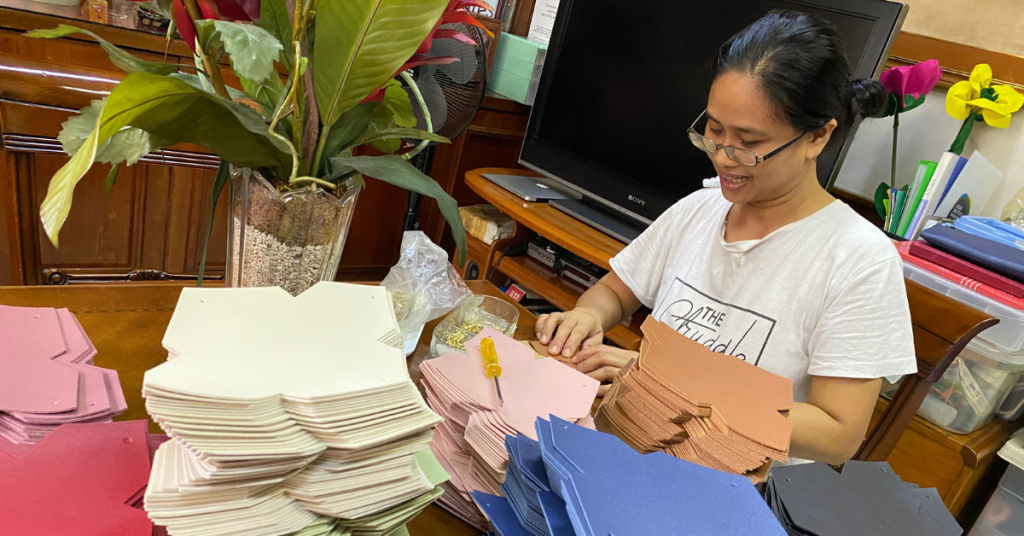
But it’s not just about the employment opportunity. Mori allows them to earn a living from home rather than working in a factory, so they can still take care of their children. There’s also flexibility during family emergencies and health issues.
With the support of the local government, slowly but surely, the social enterprise grew and the products began to be sold on Facebook and offline retail partners.
A collaboration between the Philippines and Singapore
Not long afterwards, Mitzi was approached by Rachel in Singapore who founded Matcha5, an online marketplace focused on supporting social entrepreneurship.
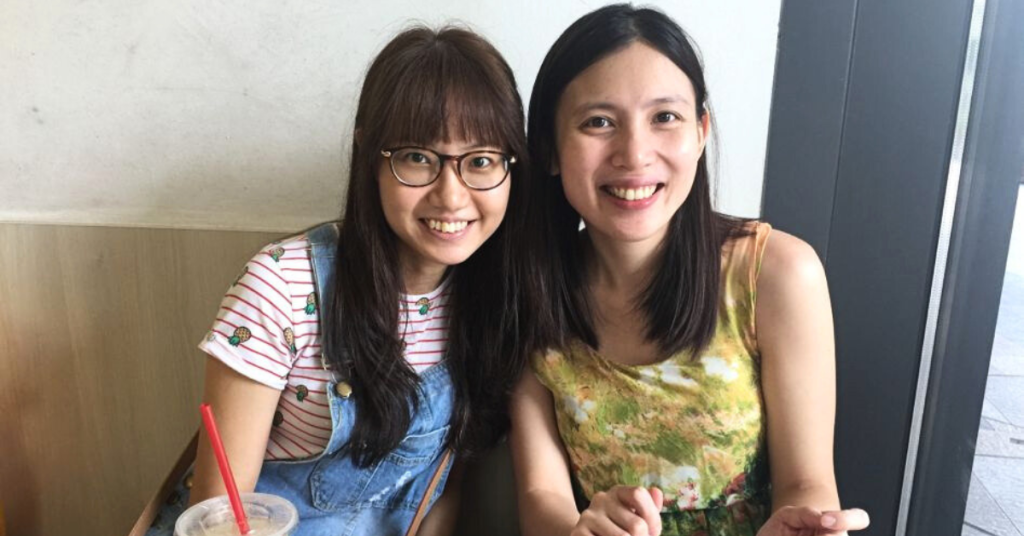
Wanting to connect further, Mitzi flew to Singapore. Long story short, they hit it off with the common dream of reducing poverty through fair employment and product value creation.
Thus began not just a friendship, but also the buds of a business partnership. While Rachel worked on product design and development, Mitzi worked with the communities in Manila to handcraft them.
Soon, the products were introduced into the Singaporean market, marking another milestone for Mori.
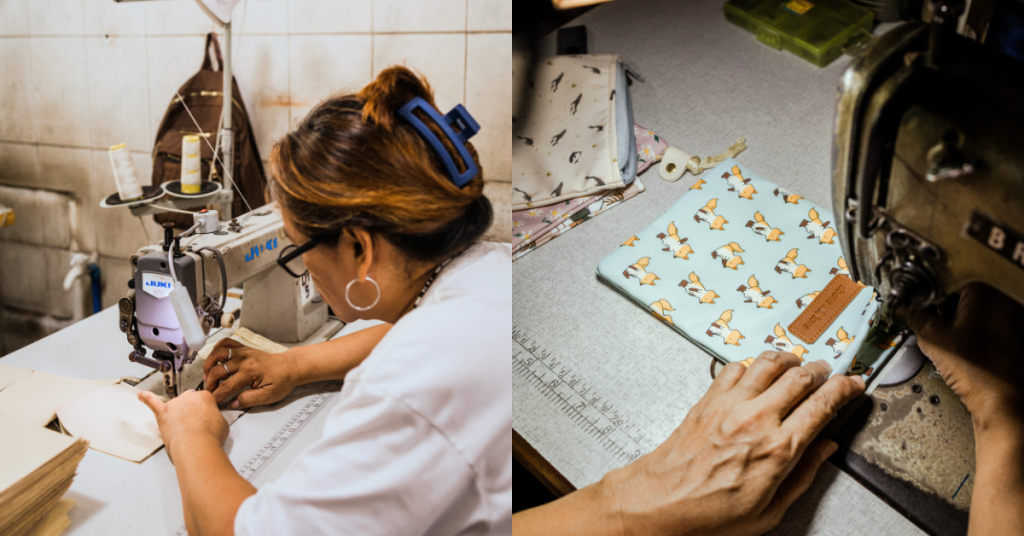
Then the pandemic hit just as they were making plans to expand the social enterprise further. But this turned out to be a blessing in disguise, as it led to more people self-reflecting, and caused a surge in demand for Mori’s pursebooks.
At the same time, having already been an online business made them one step ahead of the booming ecommerce trend. It was also this period when Mori launched its current best-selling item, the Dual Zip Sling Bag (from SG$48).
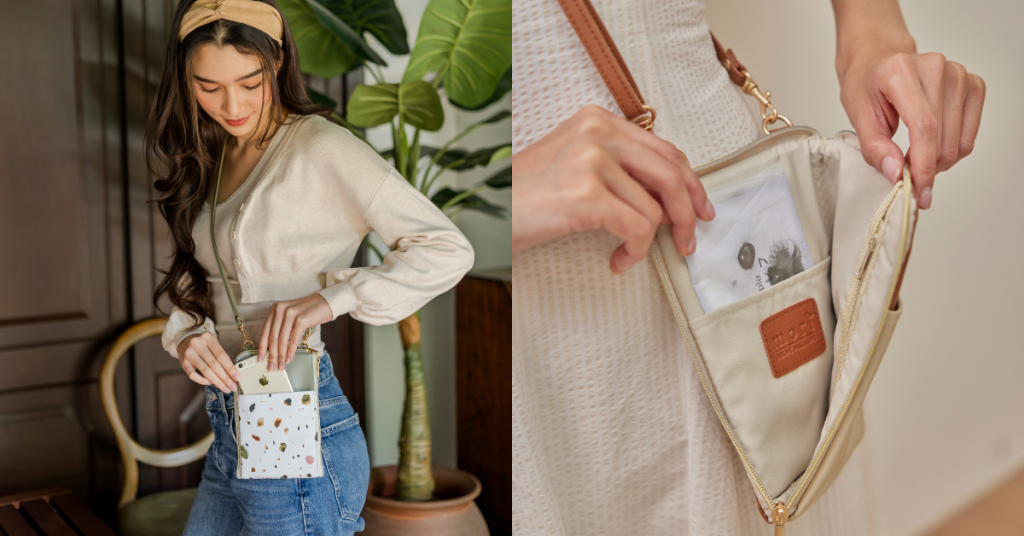
Expanding their social enterprise efforts abroad
The partnership aside, what makes Mori an international social enterprise is its commitment to helping women regardless of ethnicity and location.
For example, they recruited Miranda, a Singaporean mother of two, after she had trouble finding employment. Companies she interviewed at would often ask about her childcare arrangements and if she could commit to overtime work.
So she joined Mitzi and Rachel to help diversify Mori’s products. Aside from pursebooks and bags, the social enterprise now offers mummy and kids’ products under its new lifestyle arm, Mori Mini.
Part of this collection include the Portable Doodle Bag (SG$46), a modified adult pursebook, and a family-bonding activity box.

Similarly, they’ve trained and hired another Singaporean mum (known only as Madam S) to use Cricut machines and iron-on vinyls to personalise Mori’s products. She was referred to them by Fei Yue Family Service’s Thread of Courage.
Context: Fei Yue Family Service’s Thread of Courage is a non-profit initiative that enables lower-income individuals to earn a living from sewing opportunities.
Most recently, Madam S has also taken on the role of ecommerce order fulfilment in Singapore, which allows her to have a higher and stable monthly income.
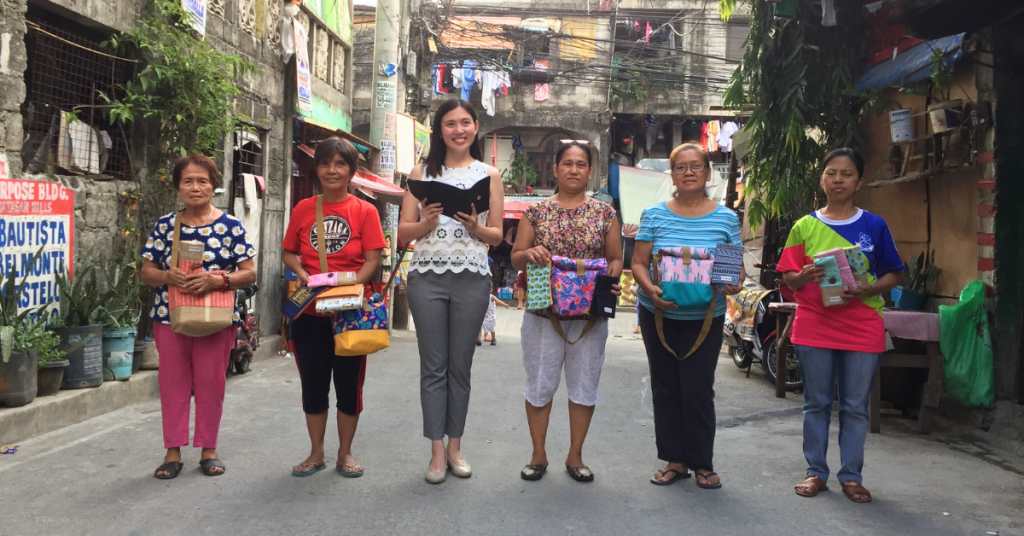
You don’t have to be “the right” person to spark change
As the business grows, the Mori team wants to explore other overseas markets like the USA. By expanding their reach, they hope to work with more communities and organisations to empower women.
They have far bigger ambitions too, such as creating workshops for training, offering consultancy services, and starting a platform to support womenpreneurs and their startups.
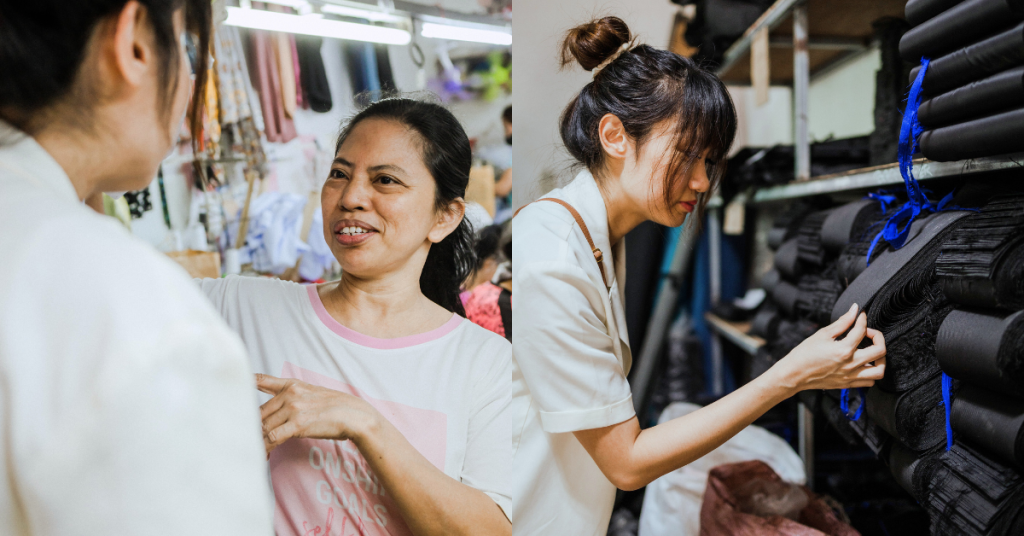
Speaking openly on the venture, Rachel explained, “For me, as I start to cross paths with more people in the social space, I start to hear and see that certain groups do require more resources, awareness, and help.”
In that light, Mirzi shared that it’s not so much about being “the right” person to support these communities. “I believe that a lot of us can create a business that has a positive impact on society. We all have people around us that are in need, whom we can bless.”
To her, it’s about utilising whatever means she has to help the people she can at that time. This is the philosophy that Mori has been upholding since the start too, and will continue to do so for years to come.
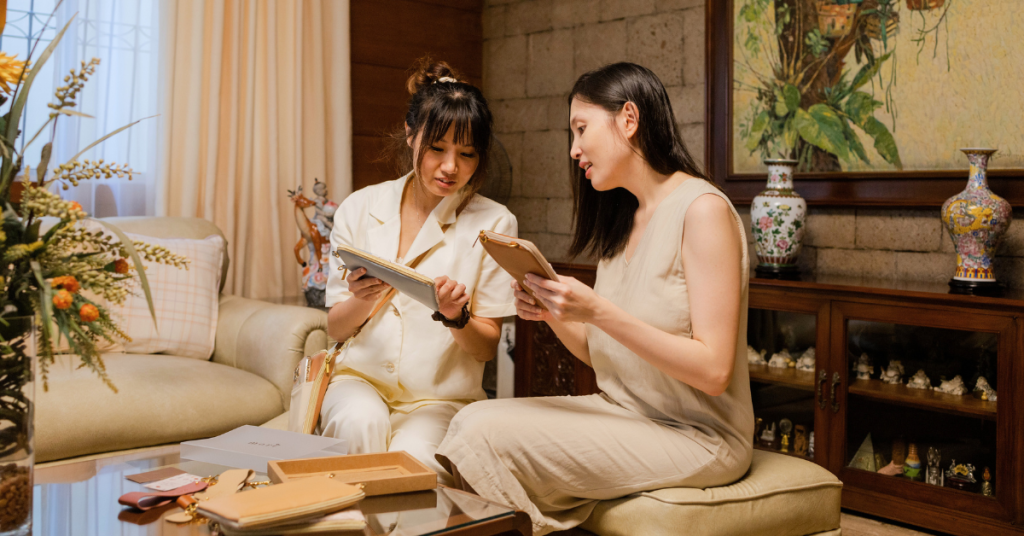
Also Read: You could win prizes worth up to RM238K when buying a home in these 5 townships by Feb 29
Featured Image Credit: Mori
I visited the 45,000 sq ft Cyberjaya preschool that’s pioneering Finnish education in M’sia
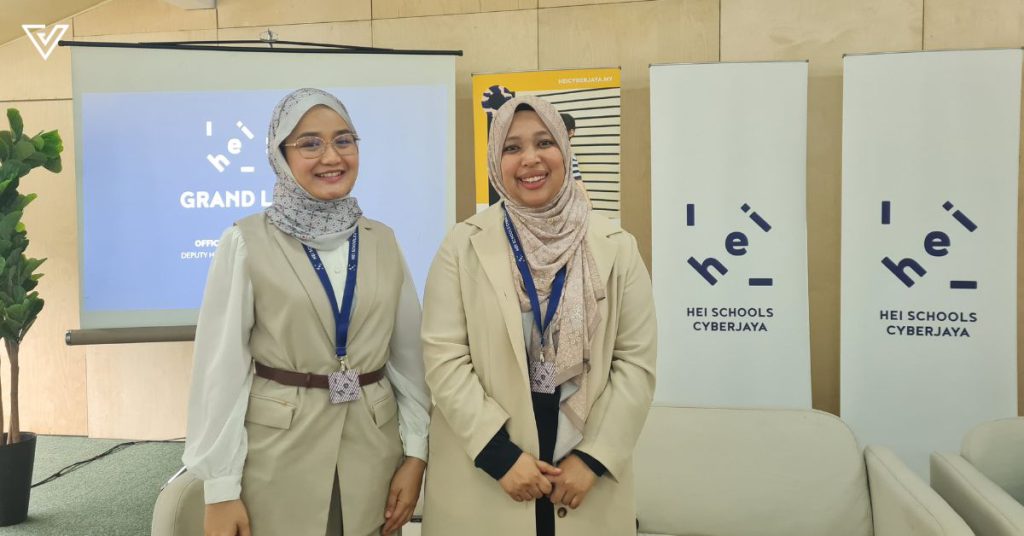
Last November, we wrote about HEI Schools Cyberjaya, a new kindergarten in Malaysia that utilised a turnkey curriculum from Finland, developed and continually updated by the University of Helsinki.
In response to our article, there were many varying opinions about this concept, with some complimenting the initiative, while others criticised it. Given these polarising reactions, we attended the grand launch of the kindergarten to take a look at the school ourselves.
Touring the campus
Having only seen 3D renderings of the compound, I was surprised to finally witness the school with my own eyes. It was less modern than I imagined it to be, which was the impression I got from the computer-generated images.
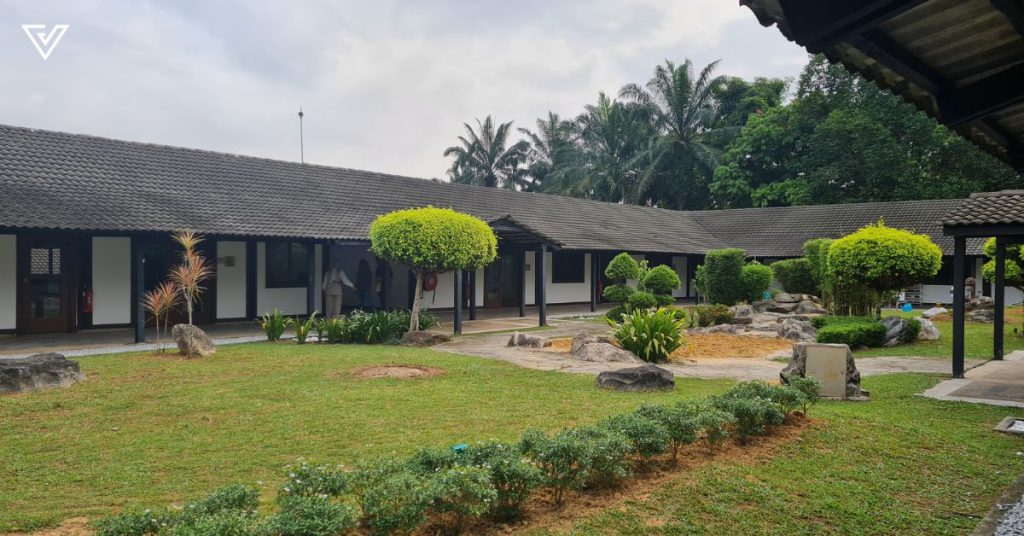
In reality, it was a lot warmer and cosier. It felt like an old resort, but the rooms have been updated with Scandinavian, minimalistic aesthetics. Some areas are carpeted, while others have wooden flooring, depending on the purpose of the room as well as the age group.
I also learnt that the school itself is housed within a 15,000 sq ft space but is on an extensive 45,000 sq ft of land that students can access.
This land comprises Cyberview Resort and Spa. Turns out, HEI Schools Cyberjaya’s building is actually the revamped version of a former Cyberview office, as was evident by some familiar motifs left there.
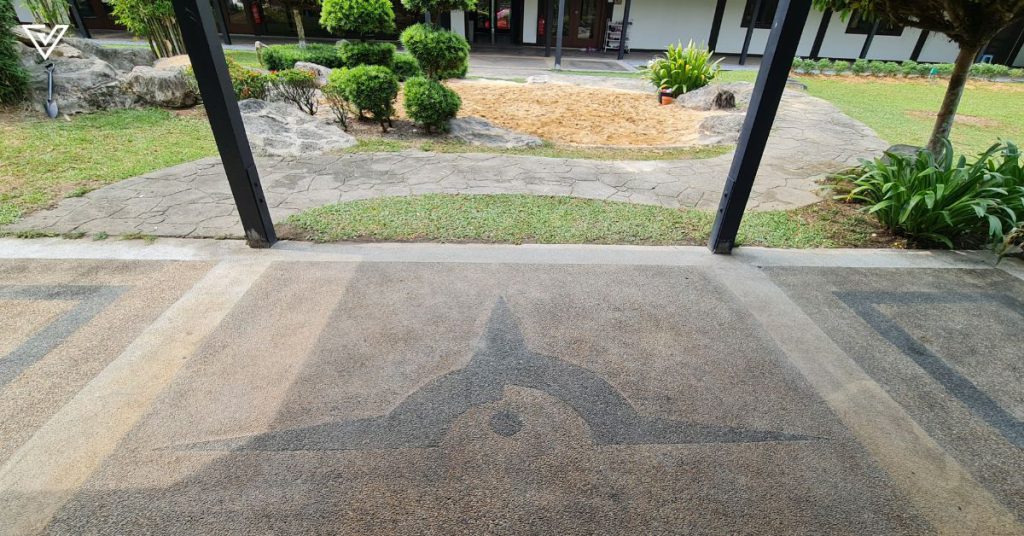
The school principal, Jacqueline Vincent, led me on a tour, along with some parents and teachers from other schools. HEI School Cyberjaya has already been in session starting January, so we were able take a peek at what each class was doing.
In every classroom I peered into, I noticed the students were mostly doing something active, showcasing the play-based Finnish style of education.
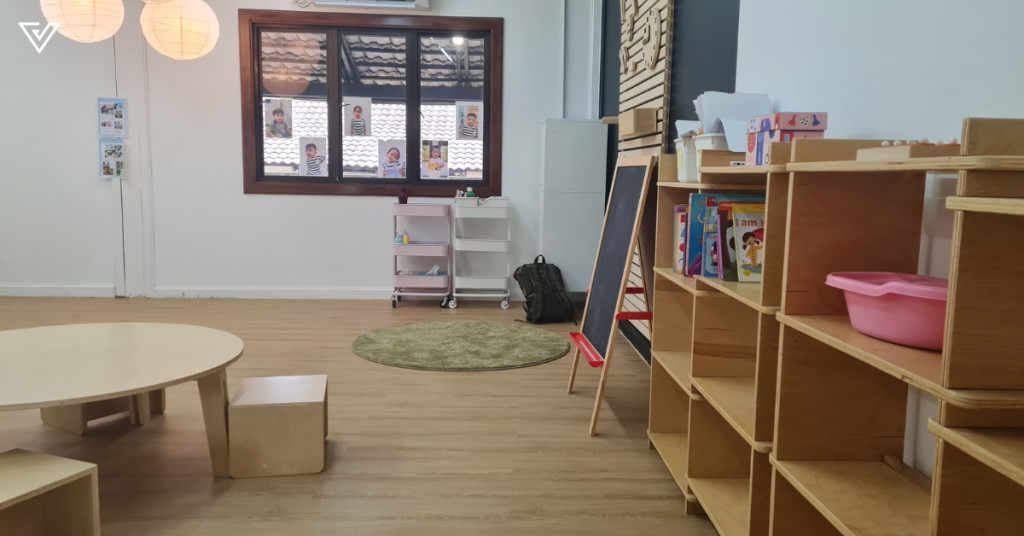
Some commenters on our previous article pointed out that most kindergartens or nurseries are technically “play-based”, and thus HEI Schools was nothing out of the ordinary.
While I can’t speak for all kindergartens, I personally had quite a different preschool experience that involved a lot of reading and tests.
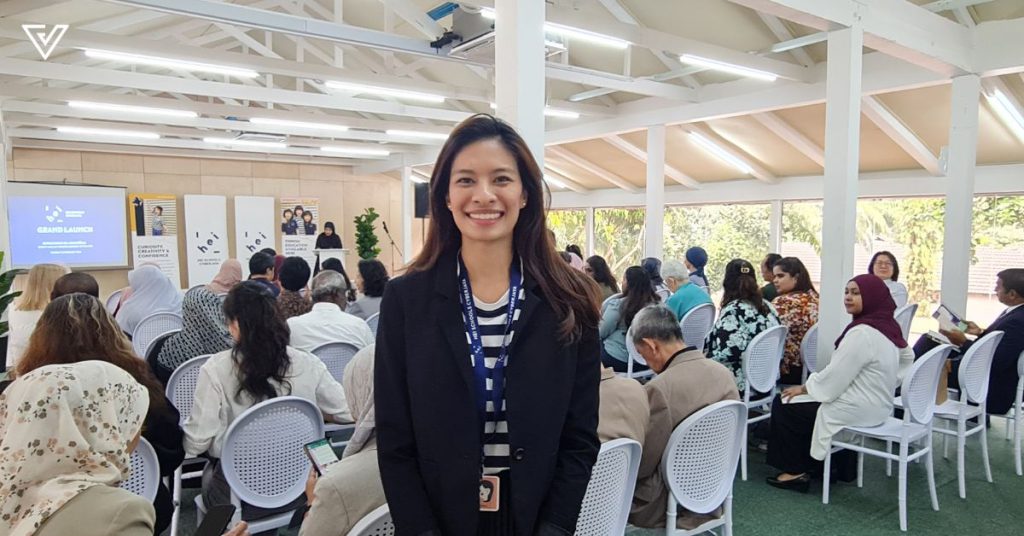
At HEI Schools, lessons are taught through creativity and exploration, and it’s actually quite practical. For example, they might learn how to count by pretending to go shopping, which could also teach them how money works.
As nice as the facilities and curriculum were, a school is a school, and kids are kids. So of course, it was not all sunshine and rainbows. There were some kids who were crying, others throwing temper tantrums.
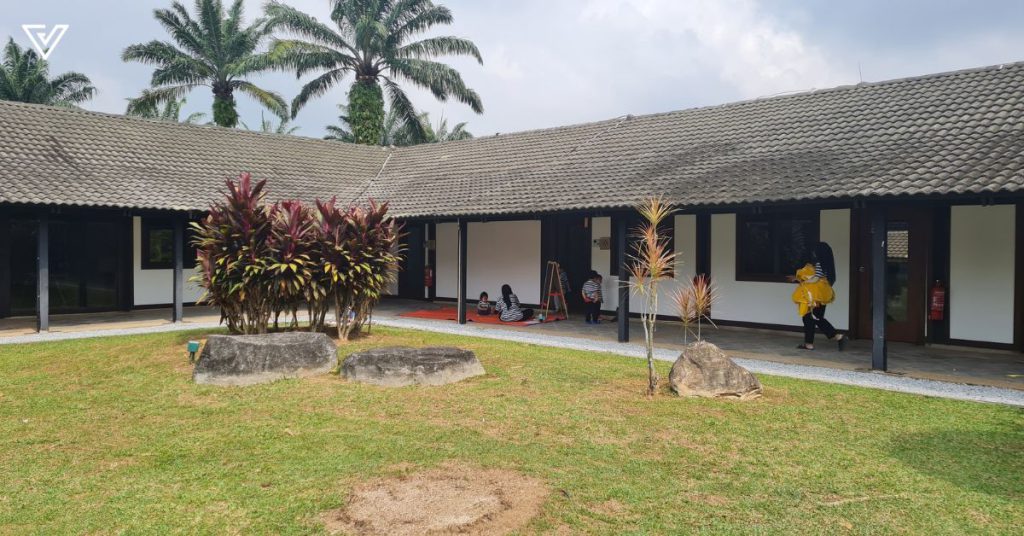
But the staff are trained to handle that. Plus, the teacher to student ratio is rather high here, with one teacher caring for four in the nursery category, one to five in pre-K, and one to eight in K1 and K2.
Speaking to Jacqueline on whether these teachers, who are expected to cater to different standards, are compensated above the market rate, she told me yes. She also said teachers at HEI are also empowered through the mandatory courses they were required to take to upskill themselves in terms of Finnish education.
Addressing cynics’ questions
During a presentation give at the launch, it was mentioned that Finnish education is less about enforcing traditional schooling practices, but instead focuses more on play.
To this, I questioned whether this mindset would affect the discipline and drive of young children.
“One thing I’ve learnt about the HEI way is that there must be a good culture of trust,” Syahirah said. “We have personally seen how when we give children options, when we let them be involved in the decision-making process, they actually feel important and are more capable of following the social requirements in the class.”
Heikki Vartia, the Head of Global Partnerships (SEA) at HEI Schools, added that the idea in Finnish education is not that the teacher pushes the child to learn. Rather, the teacher nourishes and encourages natural curiosity.
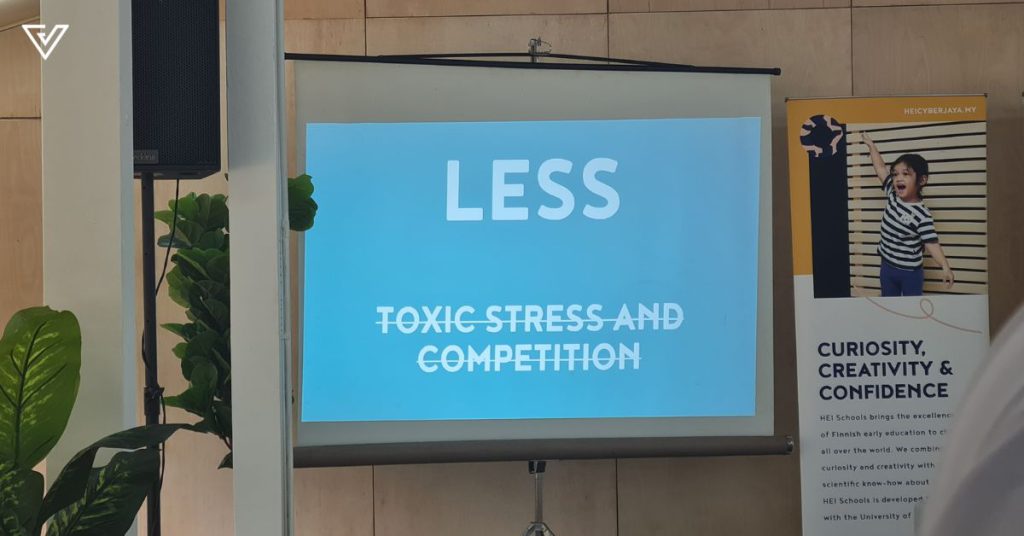
The team also addressed the topic of localisation.
Heikki also shared, “I often say, Finland has never been a colonial power, we have never had any intention of exporting our culture or tradition. What we are exporting in education is the research-based, world’s best knowledge on how children learn.”
“This is a good starting point for competent franchisees like HEI Schools Cyberjaya who can then adjust it to the local culture, tradition, expectations, and regulations.”
Syahirah Jermadi, the director of operations at HEI Schools Cyberjaya, added that they have ensured local pre-school guidelines are kept in mind as well, while still keeping to the Finnish ways.
Another common concern was whether the children will be able to keep up in primary school later. It’s a valid concern and one that many parents have.
“The key concept in this education is socio-emotional development,” said Mardhiah Zain, the executive director of HEI Schools Cyberjaya. “When a child equips good socio-emotional skills, this child can be expected to be independent.”
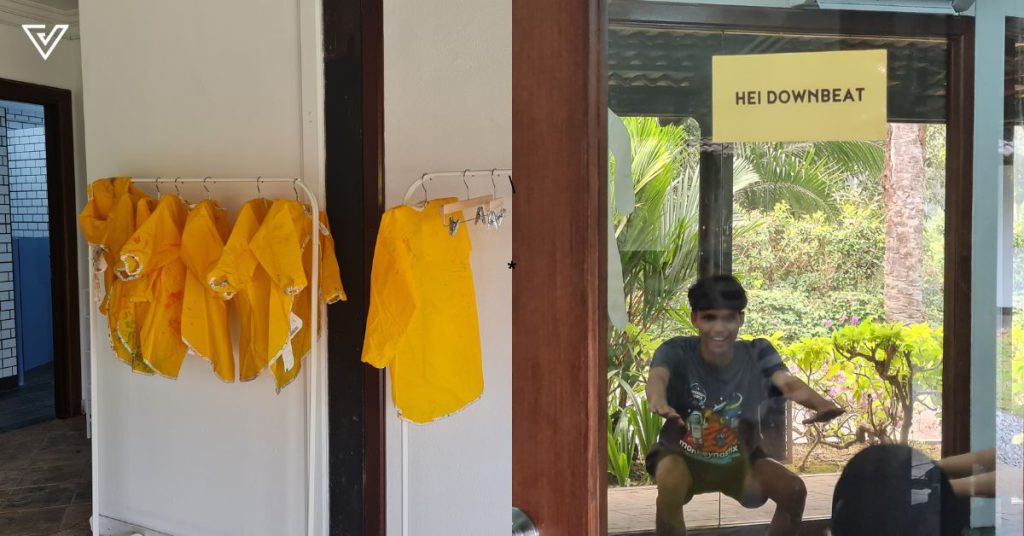
She elaborated, “When you go to primary school, the requirement is not just learning how to read, write, and count, but also how to take care of your pencil box, how to go to the toilet, how to manage your money, and things like that.”
And that’s the kind of skillset that HEI Schools fosters from a young age.
“On the academic part, it’s about how you trust the process, that when a child reaches a certain cognitive maturity, they will know how to catch up,” she said.
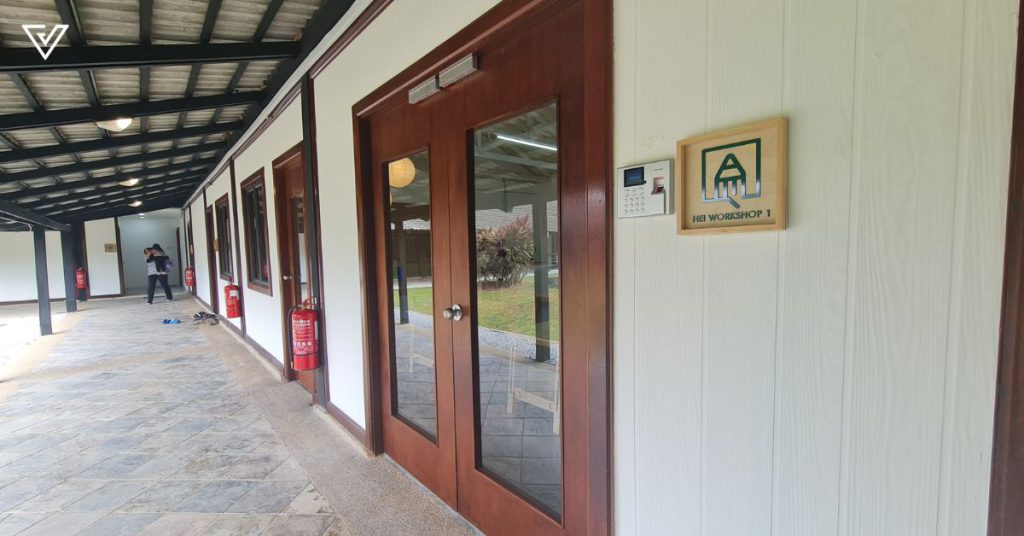
In any case, the co-founders pointed out that many of the students plan on going into international schools, because their families typically belong to the demographic who not only want to do so, but can afford to do so.
Not the only Finnish school in town
Aside from HEI Schools Cyberjaya, Malaysia seems to be experiencing increased interests in Finnish education. For example, I spoke to a representative from Cempaka International School who shared they are introducing a Finnish School Model.
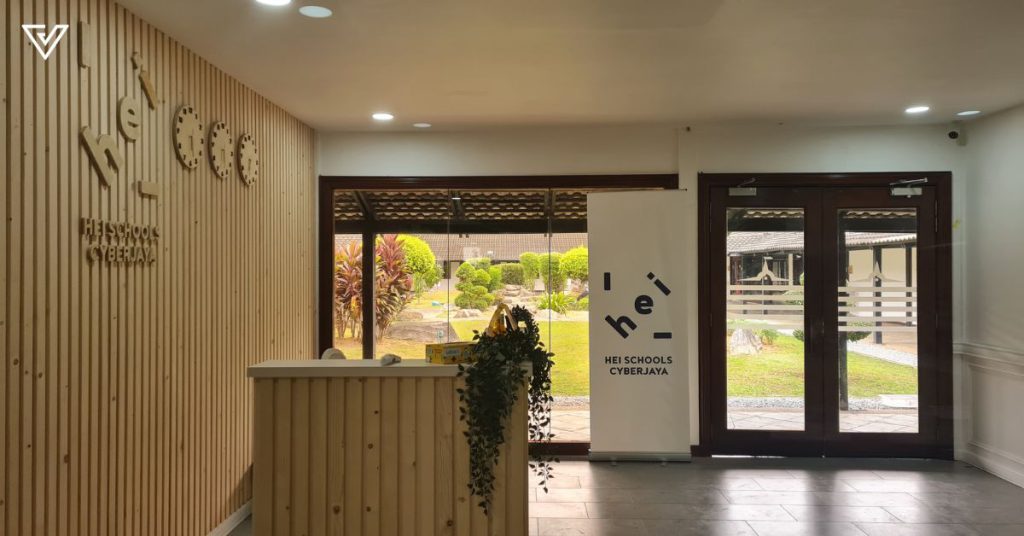
During the press conference, representatives from the HEI Schools headquarters explained that they are not in an exclusive deal with Axon Education, which is the company operating HEI Schools Cyberjaya.
Considering that this is more of a franchising sort of agreement, that means there can be other HEI Schools operators in Malaysia.
“But generally, we grant each school a radius—we don’t want HEI Schools learning centres to compete with one another, but to flourish together,” Heikki explained. “When we will open the next HEI Schools in Malaysia I don’t know yet, but it will not be next door to Cyberjaya.”
Outside of the HEI Schools brand itself, though, as Finnish education grows to become more commonplace in Malaysia, though, what would set HEI Schools’ way apart from other establishments who may adopt teachings from the Finnish system?
The answer lies in the fact that HEI Schools is attached to none other than the University of Helsinki. This means that HEI Schools’ curriculum continuously benefits from the latest research in early-age education, thereby allowing them to stay ahead of the curve.
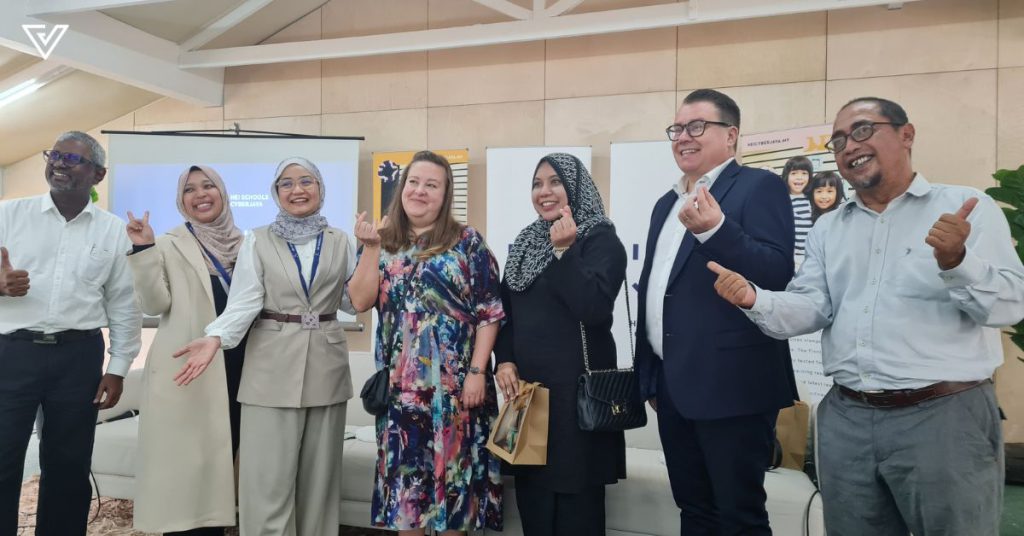
I’ll admit, I walked into the school rather cynically, being someone who felt like the competitive drive instilled into me as a child has been a net positive in my life.
But after experiencing the school and understanding the mindset behind it, I’ve learnt that academic knowledge can be acquired later in life. There’s no rush there.
Ultimately, the socio-emotional skills that allow children to navigate difficult experiences and feelings are arguably more valuable and possibly more helpful in creating a well-adjusted human being. Goodness knows that the world needs more of that.
- Learn more about HEI Schools Cyberjaya here.
- Read other articles we’ve written about Malaysian startups here.
Also Read: You could win prizes worth up to RM238K when buying a home in these 5 townships by Feb 29
Featured Image Credit: Vulcan Post
How to grow a successful retail biz, according to BilaBila Mart’s EY-awarded co-founder

It’s only natural that one of the convenience stores that I frequent the most is BilaBila Mart, since I live very close to one.
But it’s not just the proximity that has made a regular customer out of me. Rather, it’s the fact that it offers convenience, variety, and novelty—plus it mainly features smaller, homegrown brands.
A few businesses I’ve written about, in fact, have been inspired by my perusing the shelves of my local BilaBila Mart.

Recently, I was able to chat with Lee Hui Jing, one of the three co-founders behind the chain. Having led the business for the past four years, Hui Jing also has a wealth of other experiences that has informed her current role.
Here are some of the top insights I gained from her entrepreneurial playbook.
Sales targets should be team-based
Having worked many different jobs in the past, Hui Jing has learnt from one of her past experiences that when outlets provide incentives based on individuals’ performances, it can lead to a negative culture.
“It will affect the harmony of the entire team,” she explained.
Rather than individual targets, she believes that team targets will help foster teamwork and camaraderie amongst employees.
Clearly segregate your responsibilities
Prior to BilaBila Mart, Hui Jing had actually gone into business with other people. It was through those experiences that she realised how important it is for each partner to know what their roles are.
She shared that arguments may not be unavoidable still, but at least these arguments tend to be conducive.
Localise your stores
Expanding BilaBila Mart to 50 outlets doesn’t mean just copy and pasting what works in one location and applying it somewhere else.
Hui Jing explained that the team looks at the demographic of each location and actually caters to that audience.
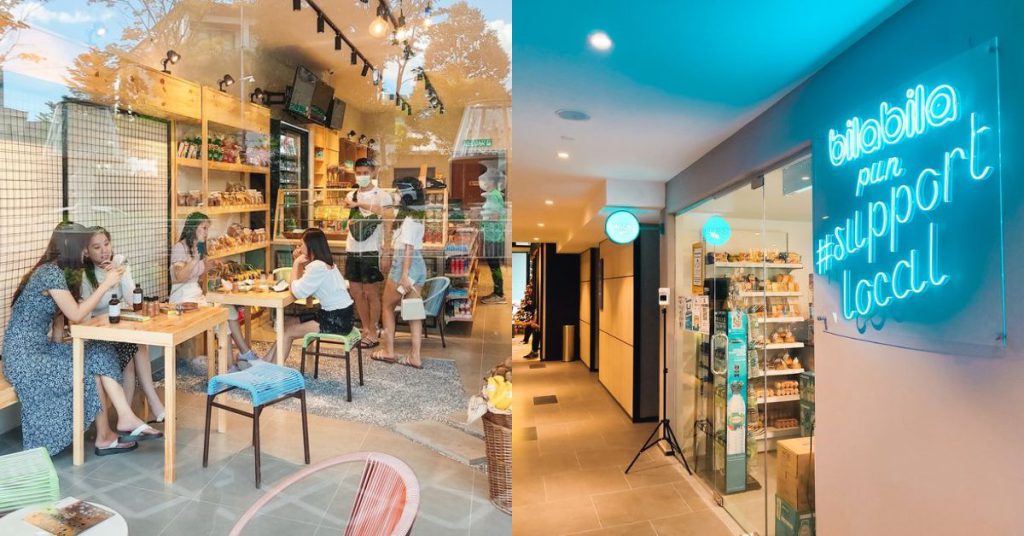
For example, in areas that may have more Chinese expats, they may carry products specific to the country and palate.
There are also fully halal outlets of BilaBila Mart (which sells products such as pork and wine in other stores), typically located in more rural Malay communities.
Another example of localisation is through branding.
“If you are observant enough, you’ll see that BilaBila have many versions of signboards,” Hui Jing revealed.

Hui Jing shared that initially, the team had used signages that emulated the old-school, nostalgic designs of sundry shops.
However, as they ventured into communities like Mont Kiara where there are more expats who may not get the reference, they decided to come up with a cleaner, modernised design.
Come up with replicable formats
As a business grows, though, it may be difficult or time-consuming to keep catering to specific demographics.
To streamline this process, Hui Jing said the team has come up with different categories of stores and formats to rely on.
For BilaBila Mart, they have four main formats depending on the location—residential, hospitality, education, and tourist locations. Within residential itself, there are the fully halal options or expat-heavy areas.
Do first, then see how
As someone who has been in the corporate world, Hui Jing understands how it’s possible to fall into something she calls “analysis paralysis”.
That means spending a lot of time analysing ideas without ever really executing them. For Hui Jing, she believes in doing first, then only seeing the risk. Of course, as a business leader, she does look at the financial exposure. As long as it is somewhat reasonable, she goes for it.
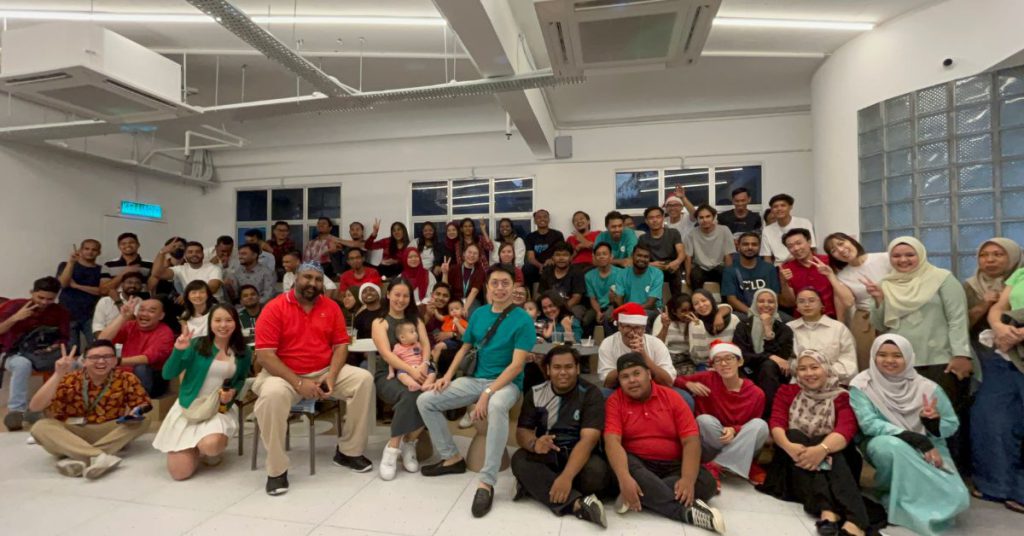
“If we don’t jalan, we won’t be able to experiment [and find out] what is right or wrong,” she reasoned.
Being agile takes practice and courage, but Hui Jing believes that since their business was born during the pandemic, they are very used to making pivots today.
See problems as opportunities
“If it’s not a life-or-death issue, it means your problem is small,” Hui Jing told me at one point, believing that some people fall into the trap of being too caught up with small problems.
She also shared that she sees many fellow entrepreneurs looking at challenges as just challenges, while she believes in seeing challenges as opportunities. This may mean opportunities for improvements, growth, or even pivots.
“When you see the benefit in things, you’ll work to solve issues,” she advised.
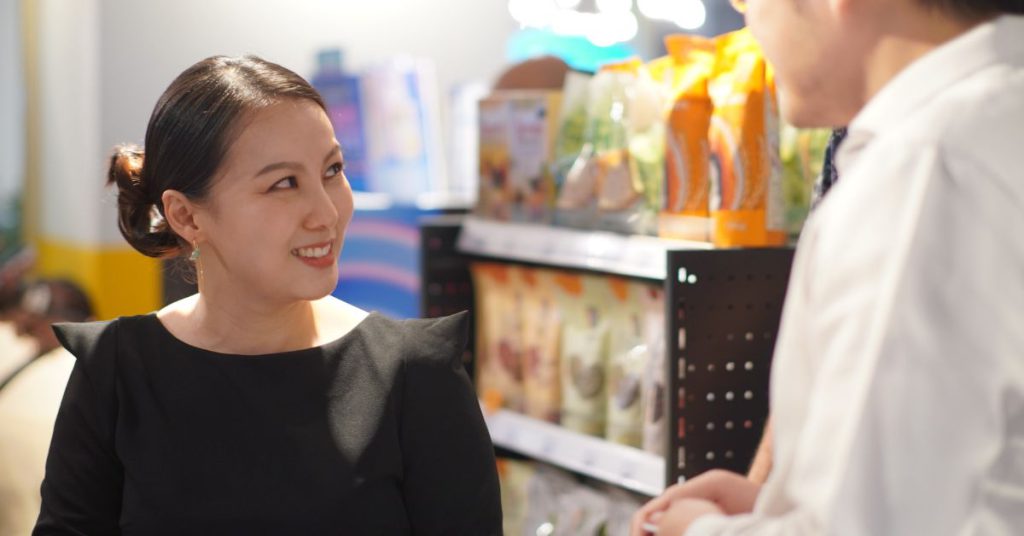
For example, when BilaBila Mart first opened, a major obstacle they faced was the pandemic. Instead of seeing it as a problem, they pivoted to promote relevant products like masks and sanitisers on Instagram and start providing delivery services.
This kind of mindset is not only apparent in BilaBila Mart’s growth despite being hit by the pandemic two days into their launch, but also Hui Jing’s own journey—which you can read more about here.
- Learn more about BilaBila Mart here.
- Read other articles we’ve written about Malaysian startups here.
Also Read: You could win prizes worth up to RM238K when buying a home in these 5 townships by Feb 29
Featured Image Credit: BilaBila Mart